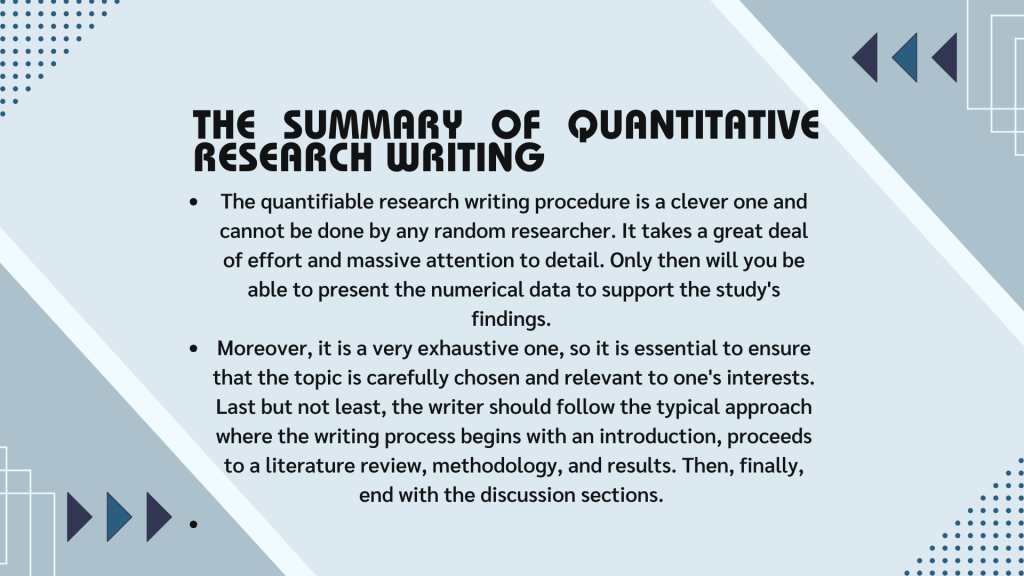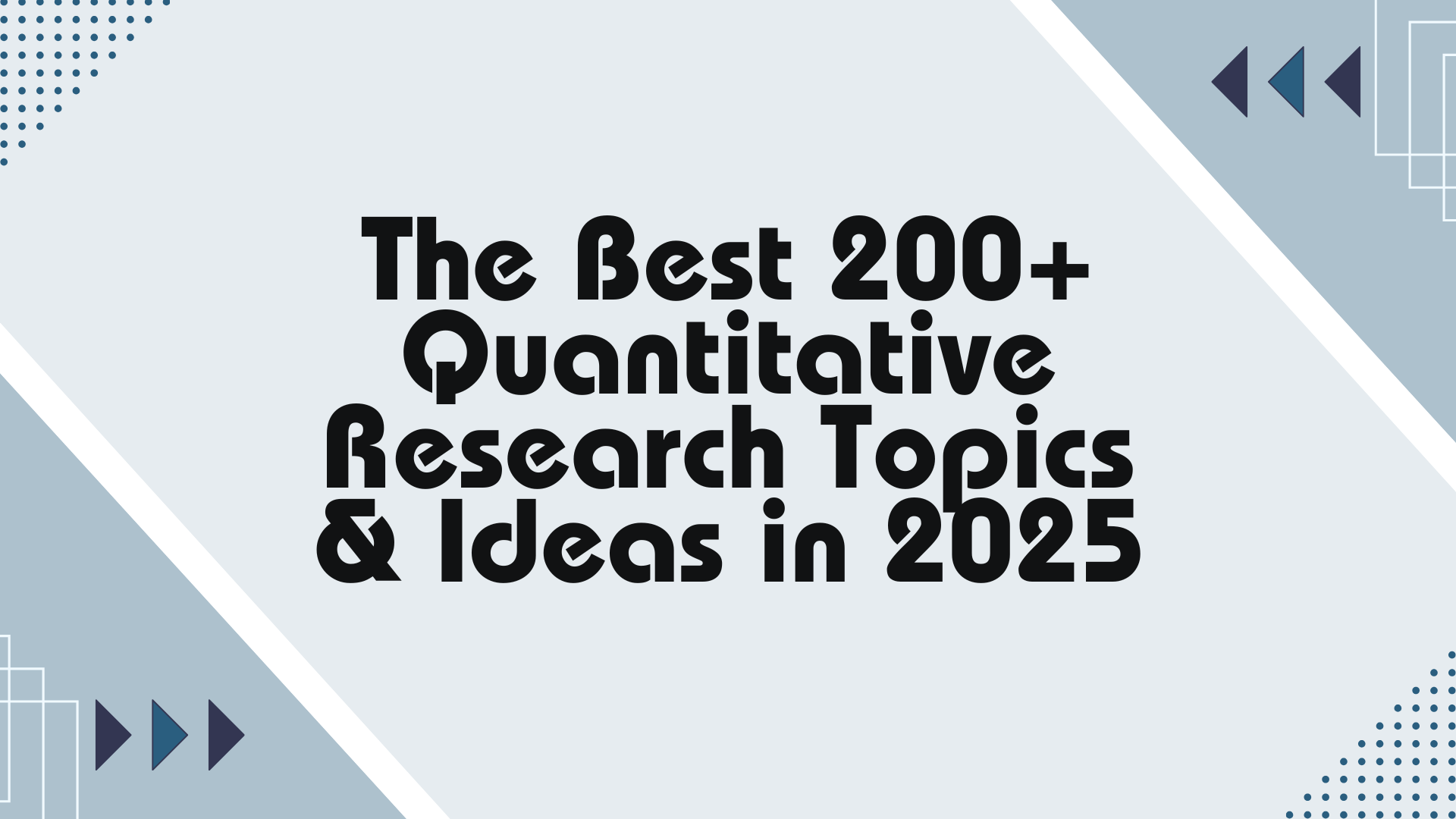The Best 200+ Quantitative Research Topics & Ideas in 2025
If the topic is pre-assigned, it is easy to quickly start the investigation and then proceed with the writing process. However, when it is up to you to choose, it is one extra step in completing the research paper. In addition, if it is a quantitative type of investigation, it is advisable to start finding an appropriate topic as soon as possible. It is a very time-consuming task, although not for those who read this blog until the end.
Quantitative Research Themes for 2025 Students
If you haven’t hired any writing or thesis editing services, it is best that you choose a topic from any of the five major categories below. They are not only carefully selected for uniqueness but also handpicked for relevance. Also, they are simplified enough to cover on your own.
Education Related Areas
There are two main sections in education that can be used to drive investigation themes. The first one is student-centered and the second is system and teacher-related. Have a look:
Student-Centered:
- The effect of study habits on academic performance.
- Correlation between sleep patterns and student productivity.
- Impact of online learning on student engagement.
- Relationship between screen time and academic achievement.
- Influence of extracurricular activities on student GPA.
- Effect of part-time jobs on college students’ academic success.
- Relationship between attendance and test scores.
- Impact of peer tutoring on student performance.
- Effect of social media usage on study time.
- Relationship between student motivation and exam results.
- Impact of school start times on student alertness.
- Correlation between physical activity and academic performance.
- Effect of homework load on student stress levels.

- Relationship between self-esteem and classroom participation.
- Impact of learning styles on test performance.
- Effect of bilingualism on cognitive test scores.
- Relationship between student-teacher bond and academic outcomes.
- Influence of school uniforms on student discipline.
- Impact of classroom seating arrangements on student focus.
- Relationship between student anxiety and math performance.
- Effect of mobile learning apps on student achievement.
- Correlation between nutrition and academic performance.
- Impact of school bullying on academic outcomes.
- Relationship between reading habits and vocabulary development.
- Effect of gamified learning on student motivation.
Also Read: What is Research? Definition, Methods, Types, Process & Examples
- Teacher and System Focused:
- Impact of teacher feedback on student improvement.
- Relationship between teacher experience and student test scores.
- The Effect of Flipped Classrooms on Learning Outcomes.
- Correlation between school funding and student achievement.
- Impact of standardised testing on curriculum design.
- Relationship between teacher burnout and student performance.
- Effect of professional development on teaching effectiveness.
- Influence of classroom technology on teaching efficiency.
- Relationship between school leadership style and teacher retention.
- Effect of curriculum changes on student learning outcomes.
- Impact of remote teaching on teacher productivity.
- Correlation between school infrastructure and student attendance.
- Effect of inclusive education policies on classroom environment.
- Relationship between regular PTM and student success.
- Impact of lesson planning on teaching quality.
- Effect of digital grading systems on teacher workload.
- Relationship between teacher expectations and student performance.
- Impact of school safety measures on the learning environment.
- Correlation between teacher gender and classroom management.
- Impact of assessment frequency on student retention.
- Relationship between school location and academic resources.
- Effect of teacher autonomy in class on curriculum delivery.
- Influence of national education policies on student results.
Also Read: How to Structure a Thesis?
Technology Themed Extensions
It is 2025, and if you are planning to write a research paper, there couldn’t be a more relevant topic than this field. It has everything you can think of, from artificial intelligence (AI) and machine learning to sustainable computing and the expansion of 5G networks. Here are a few focused themes to investigate.
- Do AI-powered tools improve customer service response time?
- Can Blockchain reduce transaction errors in digital payments?
- Are smart home devices linked to lower energy usage?
- Does wearable tech adoption vary by age group?
- Can facial recognition speed up airport security processing?
- How often do users engage with AR features in retail apps?
- Are electric vehicle users more likely to adopt solar energy?
- Does cloud storage improve team collaboration efficiency?
- How does cybersecurity training reduce phishing incident rates?
- Do biometric logins reduce password reset requests?
- How often do users abandon apps due to poor UX design?
- Can AI-generated content increase website engagement?
- How do IoT sensors improve predictive maintenance in factories?

Also Read: How to Write a Conclusion
- Does quantum computing awareness vary across industries?
- The rate of data concerns is causing users to uninstall apps.
- Are voice assistants used more for shopping or scheduling?
- Do smart traffic systems reduce urban commute times?
- Are subscription models increasing app retention rates?
- Do digital receipts reduce return fraud in retail?
- How often do users engage with gamified learning apps?
- Are hybrid cloud systems improving data access speed?
- How much time do users spend on mobile vs. desktop in 2025?
- Do AI hiring tools reduce recruitment time?
- How frequently are digital contracts used in real estate?
- Do mobile payment apps increase spending habits?
- How frequently do users use dark mode on devices?
- How often do users use multi-factor authentication?
- Are e-signatures reducing document processing time?
- Number of users and their interaction with AI-generated art.
- Do smart classrooms improve student participation rates?
- How often do users clear browser cookies for privacy?
- How frequently do users rely on AI for language translation?
- Do tech companies with remote working policies retain more staff?

- Digital Care
- How are virtual consultations and patient follow-through associated?
- Do health tracking apps affect patients’ daily activity?
- Link between wearable tech usage and cardiovascular health.
- Influence of online scheduling tools on appointment attendance.
- Impact of AI-based arrangement on clinical decision-making speed.
- Effect of electronic records on time spent per patient visit.
- Connection between remote monitoring and post-discharge outcomes.
- Role of digital literacy in tele-health satisfaction levels.
- Impact of automated symptom checkers on care-seeking behaviour.
- Association between rural connectivity and virtual care access.
- Effect of e-prescribing platforms on pharmacy error rates.
- How do app-based reminders affect chronic illness management?
- Impact of video consultations on medication compliance.
- Mental Wellbeing
- The relation between daily screen exposure and teenage mood disorders.
- Do guided meditation apps have a huge impact on apparent stress levels?
- Association between remote employment and psychological fatigue.
- Influence of digital CBT programs on sleep disturbance reduction.
- Relationship between online social interaction and emotional isolation.
- Effect of regular exercise on depressive symptom scores.
- Impact of recovery apps on relapse frequency in addiction treatment.
- Association between academic load and student anxiety.
- How do AI mental health tools help teenagers in early crisis detection?
- Effect of work-life balance on emotional flexibility.
- Influence of online counselling on university dropout risk.
- Impact of screen-free intervals on emotional regulation.
- Health Policies
- Effect of tobacco control laws on respiratory disease trends.
- Impact of public insurance expansion on healthcare access.
- Influence of authorised staffing ratios on patient care quality.
- Association between policy clarity and citizen trust in health systems.
- Effect of mental health equality enforcement on treatment availability.
- Is urgent care funding helpful for the crowded emergency department?
- Influence of cross-state licensing on physician workforce distribution.
- Association between eldercare subsidies and hospitalisation frequency.
- Impact of public health investment on disease prevention metrics.
- Chronic Diseases
- Relationship between glucose monitoring frequency and diabetes control.
- Effect of dual-drug therapy on blood pressure stabilisation.
- Link between BMI and risk of developing chronic metabolic conditions.
- Impact of home oxygen use on COPD exacerbation rates.
- Influence of dietary changes on lipid profile improvement.
- Association between exercise routines and joint pain in arthritis.
- Effect of early cancer screening on treatment outcomes.
- Relationship between medication consistency and kidney function.
- Are lifestyle coaching and the metabolic syndrome related?
- Link between insulin delivery method and patient adherence.
- Association between chronic pain and depressive symptom severity.
- Relationship between asthma control and environmental exposure.
- Influence of remote monitoring on heart failure management.
- Impact of patient education on long-term disease self-care.

Business Connected Subjects
Next up is the field of business, which is also a strong area for finding the best quantitative research topics in 2025. Below are some subject ideas that can also amplify your chances of paper publication UK.
- Consumer Marketing
- How does social media engagement predict customer loyalty?
- To what extent do product reviews shape online buying behaviour?
- Do discount campaigns increase repeat purchases?
- Can packaging style drive consumer preference?
- Does influencer reach correlate with brand visibility?
- Are faster websites linked to higher conversion rates?
- How does app design quality affect user retention?
- Do trusted brands generate more repeat sales?
- Are video ads more effective than static banners?
- How does product placement frequency affect brand recall?
- Do ad timings influence click-through performance?
- Can personalised ads boost customer response rates?
- Can loyalty programs shape shopping patterns?
- Do customer service ratings align with brand choice?
- Does product availability affect purchase urgency?
- Are higher star ratings linked to first-time purchases?
- How marketing spend aligns with quarterly sales growth
- Do holiday promotions lead to long-term revenue gains?
- Can ad colour schemes shift consumer attention span?
- Finance & Operations
- How does the change in interest rate shape borrowing behaviour?
- Do rising prices reduce household savings?
- Can currency fluctuations alter import pricing?
- Are stock gains tied to quarterly earnings reports?
- How do tax incentives influence small business expansion?
- Do higher credit scores lead to faster loan approvals?
- Can financial knowledge predict saving consistency?
- Are mobile banking users more financially active?
- Do budgeting tools improve monthly expense control?

- How does risk tolerance align with investment choices?
- Are dividend announcements followed by stock shifts?
- Do workplace savings plans increase employee contributions?
- Can debt levels forecast credit card dependency?
- Are zero-interest offers linked to higher borrowing?
- How does investor behaviour shift after economic updates?
- Do fuel price hikes raise logistics expenses?
- Can retirement planning tools improve future readiness?
- Are digital wallet users less reliant on cash?
- How do income brackets influence portfolio diversity?
- Do market cycles affect mutual fund stability?
- Organisational Management
- Do leadership styles outline team motivation levels?
- Can training hours predict employee performance scores?
- Are flexible schedules linked to higher output?
- The relationship between team size and project delivery.
- Do regular feedback sessions boost job satisfaction?
- Can office design influence staff retention?
- Are clear goals tied to better task completion?
- How do internal messaging tools affect team coordination?
- Do secure jobs foster stronger morale?
- Can remote setups maintain collaboration quality?
- Are performance bonuses linked to task accuracy?
- How does workload volume relate to employee stress levels?
- Do supportive managers encourage more innovation?
- Can promotions reduce turnover rates?
- Are strong workplace cultures associated with engagement scores?
- How does decision-making speed affect team efficiency?
- Do structured conflict policies reduce team disputes?
- Can delegation habits improve time use?
- Are onboarding scores linked to early retention?
- Do recognition programs raise organizational loyalty?
Environment Linked Themes
As far as the world has advanced in technology, it has also made significant strides in environmental consciousness. Perhaps this is why you will find a bit evolved themes in the category now. For example, advancements in renewable energy, biodiversity conservation, and pollution and waste management strategies. Below are some model topics.
- Climate, Energy, and Pollution
- Carbon emission trends in electric vs. gasoline vehicles.
- Solar panel adoption rates in residential neighbourhoods.
- Energy consumption patterns in smart vs. traditional buildings.
- Is the reduced water usage due to the smart irrigation systems?
- Waste generation per capita in urban vs. rural areas.
- Temperature rise trends in coastal vs. inland regions.
- Plastic waste reduction after single-use bans.
- Noise pollution levels near renewable energy installations.
- Household recycling rates before and after awareness campaigns.
- Greenhouse gas emissions from agriculture by crop type.
- Electricity savings from LED lighting in public infrastructure.
- Urban heat island intensity in cities with green roofing.
- Air pollution levels during high-traffic vs. low-traffic periods.
- Methane emissions from landfills with and without gas capture systems.
- Rainwater harvesting adoption in drought-prone regions.
- Fuel efficiency comparison between hybrid and electric vehicles.
- Seasonal variation in solar energy output.
- Industrial water discharge levels before and after regulation updates.
- Related to Conservation, Sustainability, and Human Behaviour
- Tree planting rates in urban reforestation programs.
- Biodiversity index changes in protected vs. unprotected areas.
- Public transportation usage after eco-incentive programs.
- Consumer preference trends for eco-labelled products.
- Green building certification rates in commercial construction.
- Wildlife population changes in areas with conservation funding.
- Composting participation rates in residential communities.
- Sustainable packaging adoption in retail supply chains.
- Water conservation behaviour in households with smart meters.
The Frequently Asked Questions of a Researcher
Q. How do I start a quantitative research project?
You can simply start by choosing a focused topic and formulating a testable hypothesis based on it. Once it is ready, you need to design a method, most likely a survey or an experiment, to collect the numerical data that you will later analyse. Ultimately, you compile and organise everything into a cohesive document, complete with references and appendices.
Q. Why is it important in 2025?
It is important because it provides objective and data-driven insights that help in solving modern challenges. Moreover, it is highly beneficial for several fields, including public health, education, and sustainability.
Q. How do I choose a good topic?
To finalise a topic, you must look for a topic that either solves a real-world problem or reflects the current trends. Moreover, it should align with your field, have accessible data and must be measurable.


